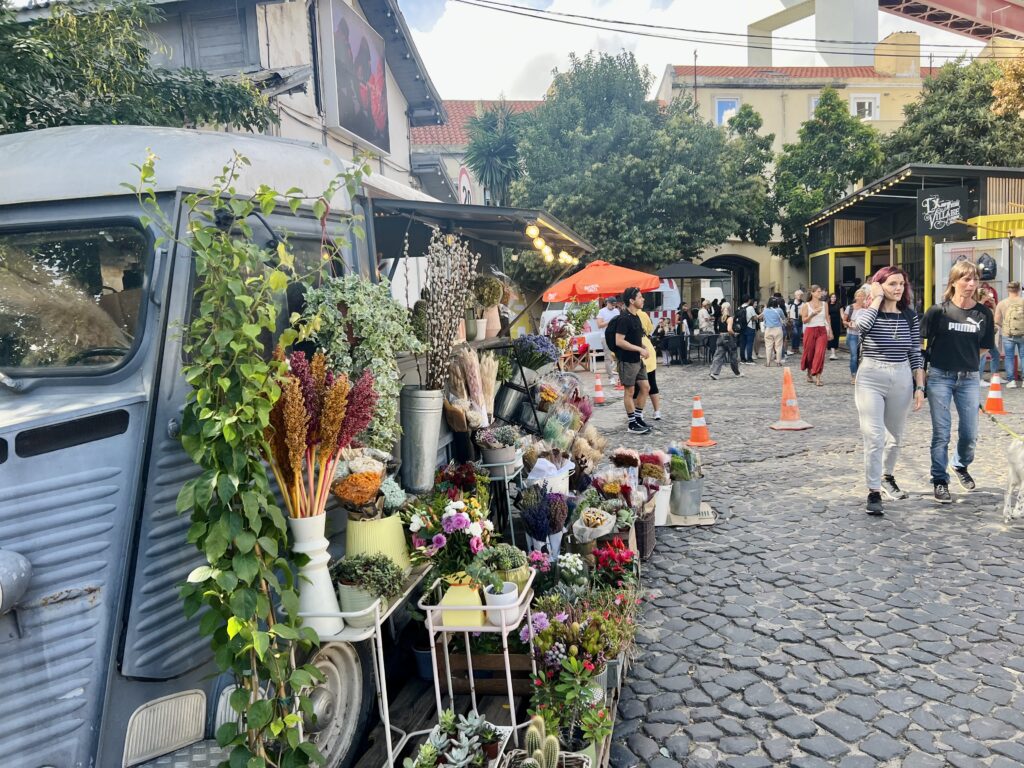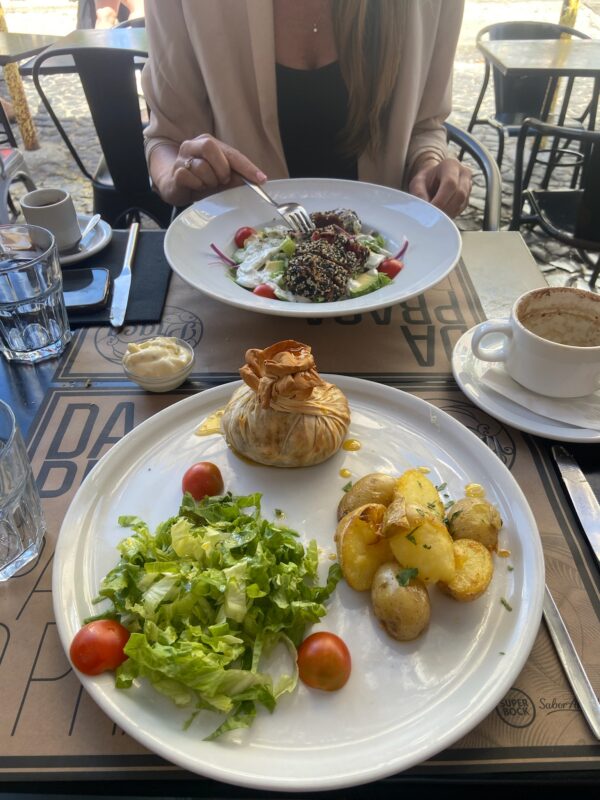LX Factory is known to be a must-stop for tourists who have a few days in Lisbon. In Belem, and near the famous 25 de Abril Bridge, the main street of LX Factory is lined with restaurants buzzing with tourists enjoying the local brews, tapas, boutique shops, and retail finds. After walking up and down, and discovering something new at every turn, we worked up an appetite for lunch at A Praça. Claiming to use only fresh market (praças) ingredients, and welcoming others as if in their own home, the environment and extensive menu won over our hungry hearts and eyes.
To be clear, this is a “tourist trap.” The entire LX Factory is a spot for tourists; I can not imagine a single local coming to one of these restaurants for a weekday dinner or lunch on a Sunday. But that’s OK. You go into these places with that expectation and understand what you’re ordering is not going to be the same authentic taste as straight from nonna’s kitchen.
That said, I decided to take the opportunity to enjoy a fresh salad, with seafood of course, and take in some healthy greens.
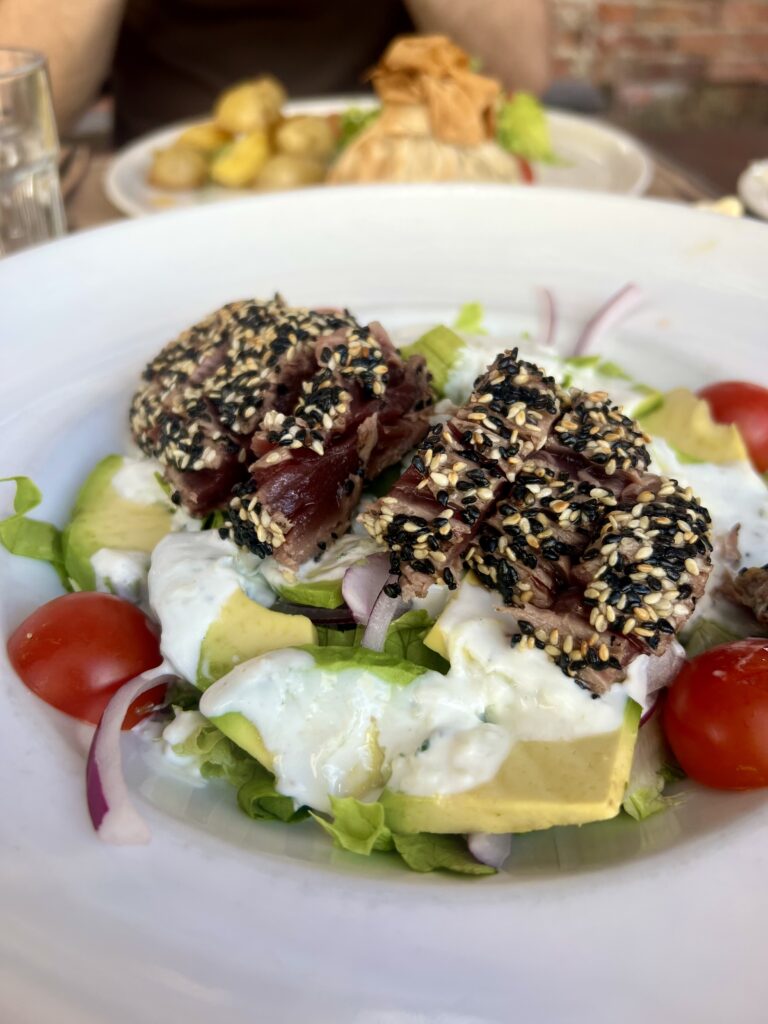
The Tuna Salad (Salada De Atum Fresco) consists of seared tuna braised in sesame seeds, over a lettuce and arugula mix. Then, it’s topped with avocado, celery, cherry tomatoes, red onion, and tzatziki sauce drizzled on top. This was great. All of the right ingredients, bright, fresh, and perfectly in season, it was a vibrant and beautiful sight to behold, and just as delicious to eat.
While cod and sardines are well known in Portuguese dishes, tuna is another fish the people have a profound appreciation for. With a perfectly seared exterior that gave way to a tender, rosy-pink center, and a hint of smokiness from the searing, the commitment to serving perfection from the sea shown right through. I mention this because while it is just a salad, it’s interesting to know how important preserving tradition is.
In Portugal, the love for seafood is intertwined with a commitment to sustainability. The fishermen here understand the importance of responsible harvesting, ensuring that future generations can savor the ocean’s treasures just as we do today.
But back to the salad and encouraging you to give it a try- Tzatziki for a dressing?? Brilliant. My love for the dip is well-documented but I also use it separately in rice bowls, as a marinade, and like this as a dressing. With the depth of flavors and texture, plus far healthier than a ranch, it really should be used to dress foods much more often.
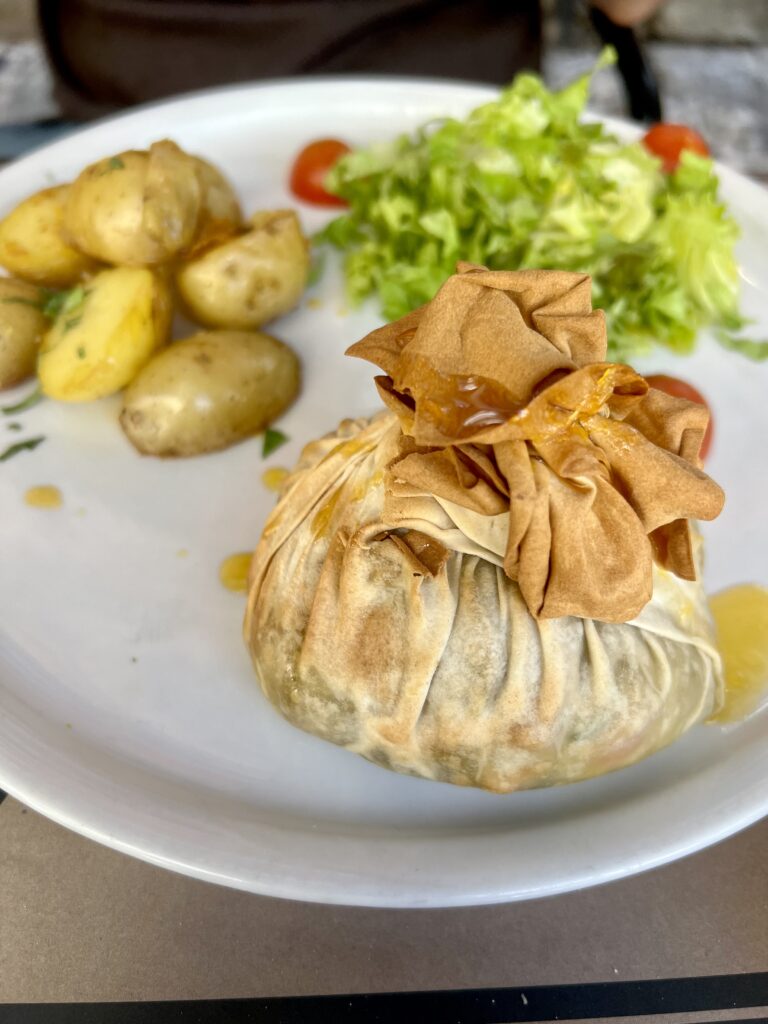
Of course, a salad calls for something more indulgent to go with it. Behold, the Duck Bundle (Trouxa De Pato). Filo pastry with duck filling, vegetables, and dried fruits, drizzled with an orange reduction and sautéed potatoes and a lettuce mix on the side.
I’ll skim right over the lettuce mix but mention it had a bomb dressing as well. Not tzatziki and not the orange reduction, but a light citrusy and zesty sauce on its own, I would bottle that up any day. The potatoes as well came to be known as the side we would come to see offered everywhere. For those interested in history, specifically food history, as much as I am, here’s a fun fact on the vegetable dating back to the Age of Exploration.
Back in the 16th century, Portuguese exploration was in high tide, exploring new lands, when they stumbled upon the potato in South America. These adventurers were quick to recognize the potential of this versatile veggie. Potatoes were hearty, easy to cultivate, and could withstand the long sea voyages without spoiling, making them a sailor’s dream come true just like cod.
However, it’s said they were initially a bit skeptical about this strange new crop. Legend has it that they used to feed potatoes to prisoners, thinking they were only fit for animals. But eventually, the potato made its way into Portuguese cuisine and won over hearts and palates. Fast forward to today, and you’ll find that potatoes are a staple in Portuguese cooking.
Pretty plain, the potatoes are served sautéed and only lightly salted, sprinkled with a bit of cilantro. They don’t taste too plain and they don’t overpower in flavor or overfill. But, next time you savor a plate of crispy Portuguese potatoes, you’ll appreciate the journey these humble spuds took to become a beloved part of the country’s cuisine.
Now let’s get to the star, the Duck Bundle:
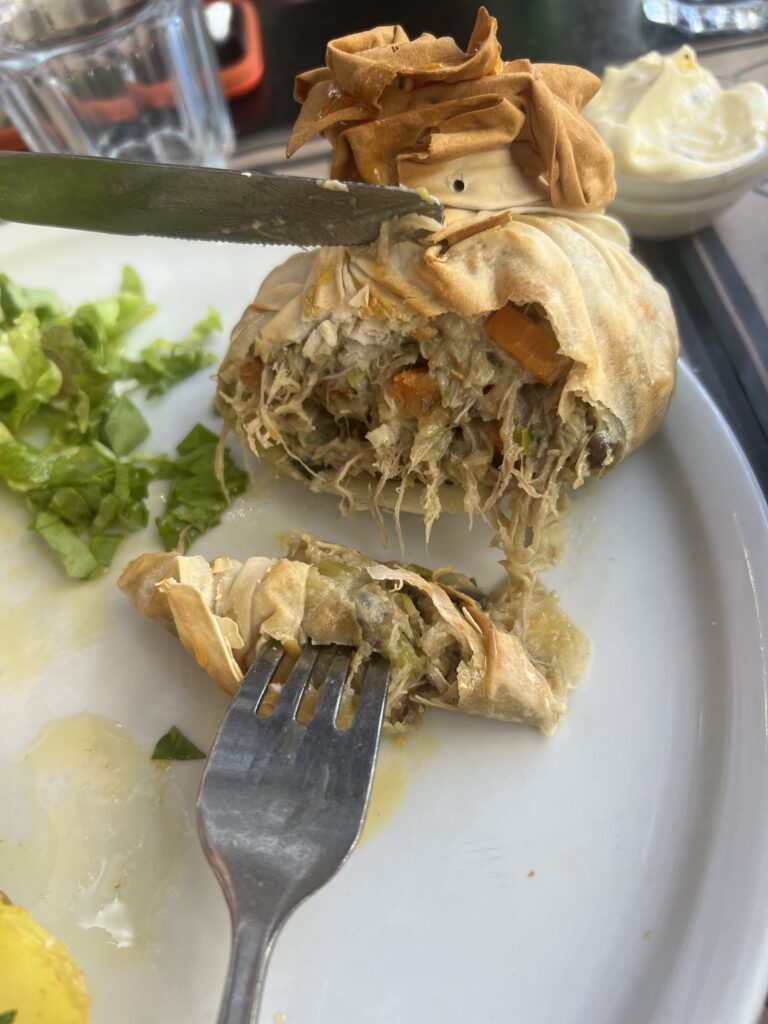
There is an argument to the idea that anything wrapped in filo dough and baked can be delicious. This particular mixture of duck, vegetables, and dried fruit, is no exception. I’ve tried duck in many ways, from Pate in Australia to Pancakes in world-recognized NYC restaurants, but this has to be the most intriguing yet. Shredded, so the typical crisp of the skin and tenderness of the meat is lost, the texture is the most distinct thing to note in the preparation. The richness of the duck brings a familiar taste and its delicately and perfectly paired with the sweetness from the dried fruit. The yin and yang duck-lovers like to see.
The entire bundle is a pleasant surprise. A little party in your mouth with vibrant vegetables, surprising dried fruits, and succulent duck, all wrapped in that flaky pastry-like dough. The pièce de résistance is that drizzle of orange reduction. Similar to the sweet dressing of the side salad, it’s something my American taste buds can’t put a finger on, other than knowing it is an excellent accompaniment. While the duck flavors aren’t for me, the dish is another testament to the innovation and creativity I loved to see in Portuguese cuisine.
Pair with a local beer and a table outside to people watch, and you have an ultimate afternoon lunch in LX Factory. Walk it off by shopping in the back alley art stores or grab a glass of wine at one of the spots under the bridge to top off a lovely experience of this worthwhile tourist spot.
